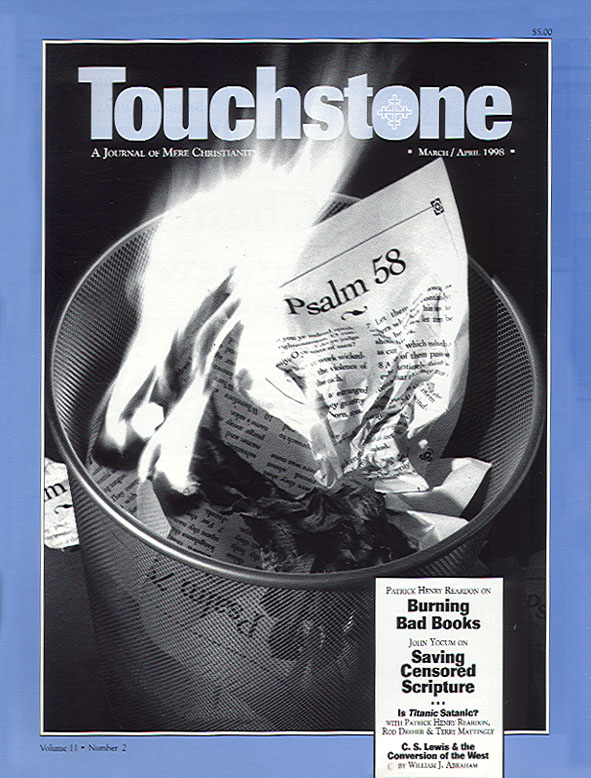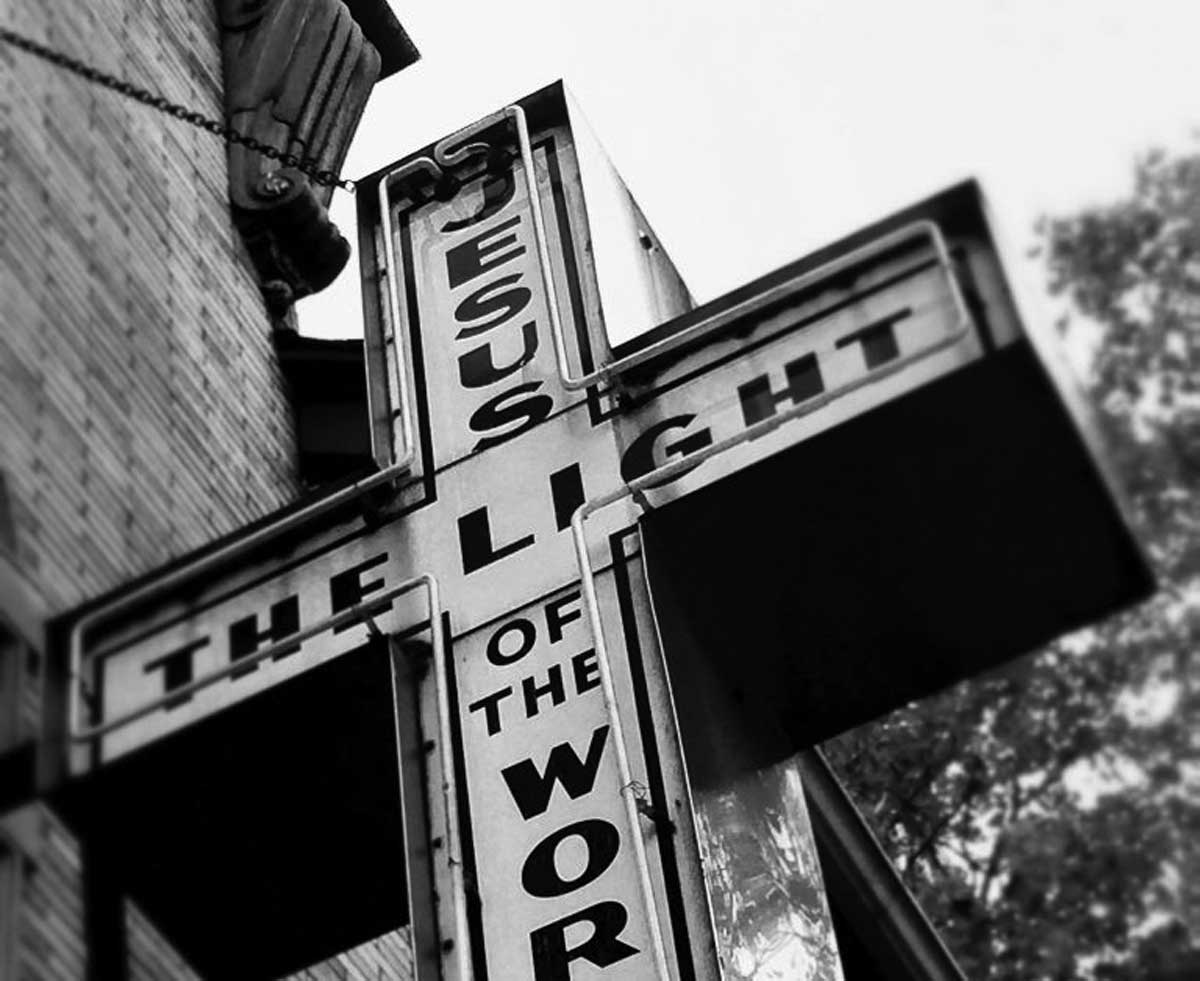Is Titanic Satanic?
An Internet Discussion Between Patrick Henry Reardon, Rod Dreher & Terry Mattingly
Patrick Henry Reardon:
Having read several conflicting assessments of the new movie Titanic, Denise and I last night finally shelled out the fifteen dollars that it cost the two of us to see it. My own view: Titanic is not only bad, it is very, very bad.
Technically more correct on certain details of the sinking, it is nowhere near so good as A Night to Remember. Reportedly the largest movie production in history, Titanic rivals the grandeur of its subject in sheer size and bulk. (Thus, it is better than the Clifton Webb film of the same name from back in the ’50s). It tries to do as a work of art what that famous ship attempted as a work of technical progress. Both productions thus make the same kind of statement.
It is a statement of rebellion against God. One critic called its theme trivial. Fair enough as far as it goes, I suppose, but it is worse than trivial. It is satanic. When, near the end of the film, the heroine Rose says of her erstwhile lover, Jack Dawson, “He saved me in every way that a human being can be saved,” she summed up my own theological and artistic objections to the film.
This film does the equivalent of holding up your hand in front of your face so that it appears to be larger than the sky. The problem is that it precludes your seeing how large the sky really is. The film’s story line puts the actual drama of the ship into the background and concentrates your attention on the silly story of a teenage girl trying to escape from a planned marriage by getting involved with a boy artist in the steerage section of the ship. The almost cosmic tragedy of the ship’s significance is blotted out for the sake of a teenage attachment. Sorry, I have raised teenagers, so give me a break.
If you want two hours of excitement with a bit of steamy sex thrown in with a certain shallow level of interpersonal moralizing, go see The English Patient. If you want to lengthen the experience to three hours, go see Titanic. Or you can save money by just taking down a volume of Hemingway and spending a week on it.
Rod Dreher:
I don’t see how you get “satanic”—an adjective applied to something of the utmost wickedness—out of this movie. I found a lot of truth in this movie—a humanist truth, to be sure, one that is imperfect in light of the gospel, but hardly satanic. Jack saved Rose’s physical life, but he also saved her from a life of stultifying convention as the wife of a harsh, unloving mogul. We—Christians in the audience—know what Rose (and the film’s writer, James Cameron) do not: she has a soul in need of saving, too. I think this philosophical/theological error is a flaw, but it didn’t ruin the movie for me, and I appreciated what truth there was in the film.
I agree completely that the romance was trite (along with the dialogue), but otherwise I had the opposite reaction. That is, the almost cosmic tragedy of all those people dying was magnified by observing its effect on the lives of two of the ship’s passengers. Those two souls had their destinies fixed by the ship’s sinking. I recall thinking on my way out of the theater about how the personal tragedies of those two must have been magnified by an entire shipload of men and women, each with a name and a face and families who loved them and wanted to see them at the dock in New York. I was reminded of the Hasidic saying often quoted by Elie Wiesel, which goes something like, “When one person dies, an entire universe dies with him.” I felt that, even though the love story was pretty cheap. Hey, it was melodrama. I didn’t expect much more than that.
In fact, what made me really like the film, even though I went in expecting to hate it, was how Cameron really emphasized the cosmic nature of the tragedy. It was hard to avoid seeing the fate of the Titanic as a metaphor for hubris, and the ultimate folly of human endeavor. The fact that we knew what awaited the ship in the ocean lent so much pathos to the gaiety of the passengers and the pride of the ship’s owners and designer. I think my favorite shot in the film was one Cameron used, as a variation, more than once. It followed a scene of merriment, I think, and was a bird’s-eye view of the ship sailing into dark waters on an open sea. I immediately thought that this must have been how God saw the boat from on high; it was so big and so impressive from the human point of view onboard, but seen from so high, it was a lonely little vessel moving implacably and ignorantly toward its doom. That really got to me.
And too, the film really rattled me, living as I do in a country and society with so much faith in wealth and technology. Those passengers, they’re us. Remember that the Titanic destroyed itself on an iceberg two years before Western civilization did on the battlefields of the Somme. It will happen again. Everything around us now appears impregnable, unsinkable, and God must be looking down now, knowing the destination we’ve chosen for ourselves, feeling very sorry for us right now.
And yet there was hope in that film, too. Rose did survive the tragedy, and what she learned from Jack delivered her from the soul-killing fate her well-born mother had in store for her. In a similar way, when the deluge finally comes for us, there will be some who only in the terror of God’s judgment come to terms with the lives they’ve been given.
I’m not going to defend Titanic as art—except for the technical aspects of the final hour or so, which were among the most exciting action sequences I’ve ever seen. It’s kind of corny and cliched, but I confess I thought it an exquisite piece of popular moviemaking, one with more of a brain about ultimate matters than nine-tenths of the Hollywood dreck I have to see for a living. The Ten Commandments isn’t art either, but for what broad goals it seeks to accomplish, it does a good job. I’d see Titanic again, even though it means having to put up with that lightweight Leonardo DiCaprio.
Seriously, though, satanic? How?
Patrick Henry Reardon:
“Satanic” is used here in its strictly theological sense: that which cometh of Satan. I weighed the word carefully and deliberately chose it in preference to other possibilities. The “humanistic truth” that you ascribe to it is what I would call secular humanism, and I regard it as one of Satan’s most manifest works. To say that Jack Dawson saved Rose “in every way that a human being can be saved” is so clearly a satanic thing to say that I don’t know how to go about demonstrating it. I think there may be a very big difference between you and me on this point, Rod. This sense of a purely “humanistic truth” goes right to the heart of my objection. Anything that says that a human being is saved by purely human means is satanic. The further need for the salvation of Rose’s soul is not an idea that the film somehow fails to mention; it is an idea that the film overtly denies.
I will respond to several of your points in order:
“Remember that the Titanic destroyed itself on the iceberg two years before Western civilization did on the battlefields of the Somme.” I thought of this continually, which is why I compared the film to The English Patient and Hemingway’s novel.
“It’s kind of corny and cliched, but I confess I thought it an exquisite piece of popular moviemaking. . . .” I concede this point readily. I enjoyed every minute of the film. Thinking about it is what got to me.
“That is, the almost cosmic tragedy of all those people dying was magnified by observing its effect on the lives of two of the ship’s passengers.” In my opinion, this shallow relationship did not carry the weight of the thing.
“It was hard to avoid seeing the fate of the Titanic as a metaphor for hubris, and the ultimate folly of human endeavor.” Au contraire, there was relatively little in the film, certainly in the dialogue, to suggest such a thing. It was not nearly so pronounced a theme as it had been in, for example, A Night to Remember. The reason it “was hard to avoid” is that that was a historical truth. In my opinion, the movie did not adequately exploit that truth. Rather, it trivialized it with teenage romance.
My objection to the film is that the film itself was a manifest act of hubris (humanistic adequacy), and hubris is satanic. Indeed, in Cameron’s comments on accepting the Golden Globe award, he compared the filming of Titanic to the original sailing of the ship. He knew it was hubris.
Rod Dreher:
Odd how we both agree that the romantic story line was trite, yet I enjoyed the film in spite of it, and you found the film a failure because of that triteness. I suppose what, finally, made Titanic so powerful for me had little to do with that aspect of the film, and everything to do with Cameron’s visual sense, and attention to detail. I thought I knew what it meant for a ship—that ship—to sink. In fact, I went into the film quite skeptical of any film storyteller’s ability to get me interested in a story I already knew the conclusion of. Cameron pulled it off.
Regarding your use of the concept “satanic,” how do you distinguish among various truths set before us, to determine what is divine, what is satanic, and what contains elements of both? Satan is the father of lies, as we know, so anything that contains untruth has some element of the satanic about it. On the other hand, God is Truth itself, so can we not say that something truthful, however flawed that presentation or understanding of truth is, has a touch of the divine? I know you’re not a fundamentalist, who would expect every novel, film, play, musical performance, and so forth, to be explicitly evangelical and otherwise theologically correct, else it be condemned as anathema. So how should the wise person proceed in judging art and avoiding exposure to something satanic? Surely not every movie that errs morally or theologically is literally satanic. Could you clarify your position a bit more?
Patrick Henry Reardon:
Yes, it is a judgment call, surely, and there is no guarantee that even two wise people will call every instance in the same way. I don’t expect every work of art to accept the Christian thesis.
A few of rules of thumb that I use, for whatever they’re worth:
First, I am much more indulgent with art works that do not have the benefit of the gospel. For example, I go easy on Aeschylus, the Vedas, and the Dialogues that describe the final days of Socrates.
Second, I keep a soft place in my heart for the struggling agnostic. I think of Victor Hugo and Aldous Huxley here. Denise and I enjoyed the film Smilla’s Sense of Snow last week as a human moral statement of, in my opinion, considerable artistic subtlety. We did not mind that the heroine was a rebel and a kind of atheist.
Third, if an artist simply decides to stop short of making more than a “human truth,” without asserting that he is giving the whole story, I am also indulgent. Shakespeare does this, I think, and the Brontes, and Miss Jane Austen.
Fourth, if an artist simply borrows our Christian themes to flesh out his own work, without slapping at Christ in the meantime, I can bear it. Thus, I don’t mind the Christ figures and the Exodus motif in Steinbeck. They never become anti-Christs. I don’t mind the Redemption metaphors in Faulkner. I had no trouble with the Christ and salvation figures in, say, One Flew Over the Cuckoo’s Nest, though most of these disappeared in the movie. I expect an artist to pick up his mythos wherever he can.
Where, in sentiment at least, I draw the line is almost exactly where, in my opinion, Titanic drew it. It used a very clear Christ symbol—Jack Dawson gives his life to “save” Rose. He saved her in two ways at least: in her physical life and in her human development. Had that been all that happened, I would not have complained. But they made that Christ symbol into a very attractive anti-Christ. The line that set me off I believe also to have been the interpretive, defining line of the film: the assertion that the sort of saving that Jack did was, ultimately, the only kind of saving possible. If that was the thesis statement of the film, then I start looking for the cloven hoof and sniffing for brimstone. Honestly, that does not happen often. Until Titanic, it had been years since I used the word satanic to describe a film.
Jack died and was buried. He did not rise again. Of course not, but then why go on to say that the dead do not rise? Why not just have Jack die and be buried? Why assert, explicitly, that that is all there is? Jack paid the price for Rose’s redemption, but that redemption, captured in the photographs that adorned her bedroom, consisted in a happy life of flying, riding horses, etc. The film said that that is all there is. That was Rose’s explicit interpretation of the whole sequence. Yet what was that final scene all about? Jack and Rose are reunited in a kind of heavenly afterlife, while the crowd from the Titanic stood around and applauded?
Even Jack’s rebellion against convention and money and materialism, Rod, was not a believer’s rebellion. Jack enjoyed the benefits of modern technology (think of him riding up at the bowsprit), even as he set himself apart from the world that produced it. In this respect, he was a disciple of Rousseau. Even more, perhaps, of Thoreau, who spent his days at Walden Pond while the economy of the rest of the world, which he despised, kept him going.
The sex, too, was cheap and irresponsible, like Rousseau’s sex. “I would rather be his whore than your wife.” Oh, great.
Terry Mattingly:
My “Media Models in Church and Parachurch” seminar is now studying the film, trying to answer the question: What was the director trying to say? So far, we conclude that it’s another statement against old ways and patriarchy, from the viewpoint of a man who thinks he’s upholding women. It’s obviously some sort of “freedom” statement on escaping conventional society, and so on.
My summary of the film: The Titanic sank and that’s tragic, but at least some people on board got to experience the ’60s.
I recommend renting the A&E four-hour series called “Titanic: Death of a Dream.” The first hour is especially important. It nails the heart of the matter. What was “the dream”? That would be nineteenth-century liberalism, the worship of science and technology and the belief in the perfectibility of mankind. Show this video to anyone who is really stuck on the current Titanic.
Rod wrote: “It was hard to avoid seeing the fate of the Titanic as a metaphor for hubris, and the ultimate folly of human endeavor.”
And Fr. Pat replied: “Au contraire, there was relatively little in the film, certainly in the dialogue, to suggest such a thing. It was not nearly so pronounced a theme as it had been in, for example, A Night to Remember. The reason it ‘was hard to avoid’ is that that was an historical truth. In my opinion, the movie did not adequately exploit that truth.”
This expresses my thoughts. You can’t avoid nearly a century of interpretation of the sinking or the facts about the event. But the director tried to, oh how he tried . . . .
Terry Mattingly teaches at Milligan College in Tennessee. He writes a weekly column for the Scripps Howard News Service.
Patrick Henry Reardon is pastor emeritus of All Saints Antiochian Orthodox Church in Chicago, Illinois, and the author of numerous books, including, most recently, Out of Step with God: Orthodox Christian Reflections on the Book of Numbers (Ancient Faith Publishing, 2019).
subscription options
Order
Print/Online Subscription

Get six issues (one year) of Touchstone PLUS full online access including pdf downloads for only $39.95. That's only $3.34 per month!
Order
Online Only
Subscription

Get a one-year full-access subscription to the Touchstone online archives for only $19.95. That's only $1.66 per month!
bulk subscriptions
Order Touchstone subscriptions in bulk and save $10 per sub! Each subscription includes 6 issues of Touchstone plus full online access to touchstonemag.com—including archives, videos, and pdf downloads of recent issues for only $29.95 each! Great for churches or study groups.
Transactions will be processed on a secure server.
more from the online archives
calling all readers
Please Donate
"There are magazines worth reading but few worth saving . . . Touchstone is just such a magazine."
—Alice von Hildebrand
"Here we do not concede one square millimeter of territory to falsehood, folly, contemporary sentimentality, or fashion. We speak the truth, and let God be our judge. . . . Touchstone is the one committedly Christian conservative journal."
—Anthony Esolen, Touchstone senior editor









